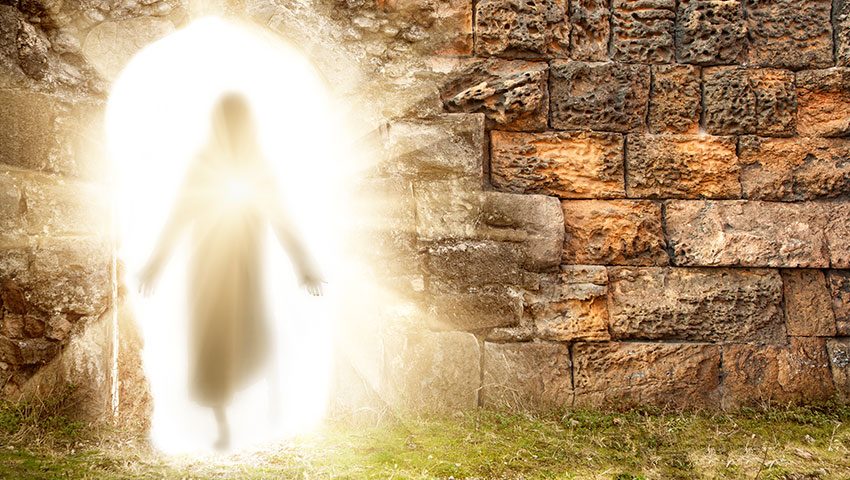Easter, which in Christian tradition celebrates the resurrection of Jesus after the crucifixion, is one week after Palm Sunday. What exactly is Palm Sunday? What really happened on that day and the following days before Jesus’ arrest that led to His crucifixion and resurrection?
The Fifth Epochal Revelation found in The URANTIA Book gives us detailed information of what occurred during the weeks leading up to Jesus’ arrest and is found in Papers 172 to 182. Papers 183 to 187 relate the events of Jesus’ betrayal, arrest, persecution, trial, and crucifixion. Papers 188 and 189 tell of Jesus’ resurrection, explaining how and why that was done. And Papers 190 through 193 relate Jesus’ nineteen appearances after His resurrection when He was in what The URANTIA Book terms His “morontia forms.” A morontia form is a semi-spirit form. Those papers relate who He appeared to in those morontia forms as well as the teaching and words of encouragement that He gave.
The events leading up to that Palm Sunday on April first a.d. 30 had established Jesus as an enemy to the hypocritical, power-hungry, greedy, and prideful Jewish religious leaders of the day—the Pharisees and the Sadducees. They were threatened by His influence over the people, and angered by His confrontations with them about their wrongdoing and abuse of power and responsibility. These religious leaders did not want to lose their positions of authority and prestige, and they did not like being told of their own error, sin, and iniquity. They were certainly good at making those under their spiritual care feel worthless and evil, needing to make many expensive sacrifices to appease God's wrath. But these so-called religious leaders did not want to address their own imperfections.
Jesus taught that all people were imperfect but still highly valued and loved by their Universal Father, referred to by us humans today as “God,” the “Creator,” “Wankun Tanka,” “Yahweh,” and “Allah,” just to name a few.
Jesus also taught that there was no need to continually feel guilty and worthless for error and sin, and that the love and mercy of God forgave all wrongdoing of any person who sincerely wanted to become a better human being and serve God and his or her brothers and sisters in genuine love.
According to Jesus, each human being had a Fragment of God within him or her, which many call the Spirit of God and which The URANTIA Book refers to as the Thought Adjuster or Mystery Monitor. That Fragment of the Father can empower us to become much more than we are in the moment if we are aware of Him and open to cooperating with that spirit of God within us.
Jesus emphatically stated that there was no need for sacrificing animals or relying on the priest or religious leaders to be the ones to pray and represent individuals with God. Rather individuals could each pray and commune with God themselves in order to ask for healing, forgiveness, and godly power/Deo power to become all that a person is destined to be within God's perfect will.
The Master indicated that true spiritual leaders would bring revelation to others, confronting people of their errors, sin, or iniquity and encouraging them to become all that God would have them become. He demanded that individuals rise above their own pettiness, fears, misconceptions, illusions, and selfishness.
Jesus told the people that in their spiritual walk they could never become too comfortable within their established ways of thinking and doing, that they would need to continually reach for higher and expanded truth, and constantly strive for more perfect being.
The enemies of Jesus did not like these teachings, for that meant that they could not become crystallized in their own established power over other people. They would continually be held accountable before God and others to become all that God would ask them to become, walking in humility and constantly changing that within them which was not in divine pattern.
******
So that Sunday morning on April 1 almost 2,000 years ago (what we now refer to as Palm Sunday), Jesus had many enemies. Before leaving to enter Jerusalem that day, Jesus gave a little teaching to the host where He had spent the night a couple of miles outside of Jerusalem.
When referring to the prophet Joshua of old and the legend of Joshua causing the walls of Jericho to fall down so he could enter the city, Jesus said,
“I am not concerned with such walls of brick and stone, but I would cause the walls of prejudice, self-righteousness, and hate to crumble before this preaching of the Father’s love for all men and women.”
Jesus made arrangements to ride into Jerusalem on an ass, a donkey, as a statement of who and what He was about. According to Jewish tradition, a warrior king always entered a city riding upon a horse. A king on a mission of peace and friendship always entered riding upon an ass. Jesus would not enter Jerusalem as a man on horseback, but He was willing to enter peacefully and with good will as the Son of Man on a donkey. We are told in The URANTIA Book:
Jesus did not decide to make this public entrance into Jerusalem as a last bid for popular favor, nor as a final grasp for power. Neither did he do it altogether to satisfy the human longings of his disciples and apostles. Jesus entertained none of the illusions of a fantastic dreamer. He well knew what was to be the outcome of this visit . . . .
Jesus had long tried by direct teaching to impress upon his apostles and his disciples that his kingdom was not of this world, that it was a purely spiritual matter; but he had not succeeded in this effort. (Paper 172, Section 3)
Everyone had their ideas of what Jesus should be doing, and most of them were very materialistic and political. What He had not been able to accomplish by personal teaching He attempted to do by a symbolic appeal when He chose to ride into Jerusalem on a donkey that morning.
I am reminded of the late great spiritual activist, Mother Teresa, who simply taught by living a powerful life of service. She did not give too many talks or speeches. She did not write many books. She simply acted out her goodness. And when she entered certain cities that she was visiting in this country, knowing that the crowds would be there to cheer her on and acknowledge her, she refused to enter in a limousine but chose instead a less expensive and less ostentatious vehicle. That act was a symbol and a statement about the error of opulent and wasteful materialism in the face of abject poverty and suffering. Mother Theresa refused to take part in any symbol or act that would encourage that kind of materialism.
Jesus entered Jerusalem knowing that His enemies were waiting to have Him arrested and executed. He also knew that if there was a crowd cheering Him and accepting His entry that He would at that moment be safe from His enemies, for they would not dare go against the feelings of the multitude. He wanted to make a last effort in reaching out to the masses, hoping that they could make a shift in their consciousness and see who and what He really was. In other words, see with the spiritualized mind rather than with the lower human understanding.
The URANTIA Book tells us that “Jesus was lighthearted and cheerful” as He and his Apostles traveled the two miles to Jerusalem. But “when they came to the brow of Olivet where the city of Jerusalem and the temple towers came into full view, the Master stopped” and began to weep. His Apostles were shocked to silence to see Him weeping. So quickly Jesus moved from the emotion of being lighthearted and cheerful to the emotion of grief. “Looking down upon the vast multitude of people coming forth from the city to great him, the Master with much emotion and with tearful voice said, “O Jerusalem. . . .” Jesus would be saying this today to all the peoples of the planet who have taken part in the materialism and the emptiness of the dominate cultures. He would say, “O Urantia,”
If you had only known, even you, at least in this your day, the things which belong to your peace, and which you could so freely have had! But now are these glories about to be hid from your eyes. You are about to reject the Son of Peace and turn your backs upon the gospel of salvation. The days will soon come upon you wherein your enemies will cast a trench around about you and lay siege to you on every side; they shall utterly destroy you, insomuch that not one stone shall be left upon another. And all this shall fall you because you knew not the time of your divine visitation. You are about to reject the gift of God, and all men will reject you. (Ibid.)
Today we are in what some refer to as the end times or tribulation. It is indeed the times of the earth changes and what is also referred to as the time of purification. It is the end of the fallen state of our world and the beginning of a Divine New Order, the first stage of light and life. As it was on a Palm Sunday in 30 a.d., so it is in these times. Christ Michael, the Universe Mother Spirit, and all of the celestial personalities serving us humans on this earth are weeping with great compassion and sadness over the error, sin, and iniquity in their beloved humans on Urantia (Earth).
And like Jesus did almost 2,000 years ago on the mount of Olivet, Celestial Overcontrol realizes that the choices of individuals over a period of hundreds and thousands of years create a consequence of devastation and destruction of all that is out of divine pattern. Oh, the suffering that could be prevented if God's beloved children would only make that quantum leap by coming into the epochal revelation given for this time and by living that revelation, as those of Jesus’ time should have come into the Fourth Epochal Revelation—Him, the Son of Man and the Son of God.
Even though the crowd was wild with enthusiasm for Jesus on that first Palm Sunday, The URANTIA Book informs us that:
There really was no deep significance to be attached to this superficial and spontaneous outburst of popular enthusiasm. This welcome, although it was joyous and sincere, did not betoken any real or deep seated conviction in the hearts of this festive multitude. These same crowds were equally as willing quickly to reject Jesus later on this week when the Sanhedrin once took a firm and decided stand against him, and when they became disillusioned—when they realized that Jesus was not going to establish the kingdom in accordance with their long cherished expectations. (Ibid.)
How often do we get mad at God because He is not meeting our agenda? How many times do we turn away from a true prophet of God, a true spiritual teacher and leader who does not meet our expectations of enabling us to remain in our fears, prejudices, selfishness, and pride? How often do we shun certain truth presented in the epochal revelation of The URANTIA Book and The Cosmic Family volumes because they challenge our established way of understanding reality? Isn't that what happened to the Fourth Epochal Revelation, the Son of God, Jesus of Nazareth?
Jesus disappointed many because He would not meet their agenda of becoming a powerful political ruler who would usurp the Roman government. He angered many, because He confronted them in their error, sin, and iniquity. And He did teach the difference between error, sin, and iniquity, that there are degrees and levels of wrongdoing. But He offered hope, healing, joy, and peace to those who received His teachings, His admonitions, His love, and His mercy.
Today Jesus Christ Michael continues to offer admonitions and healing. In Paper 171, Section 7 entitled “As Jesus Passed By” of The URANTIA Book, we are told that Jesus spread good cheer everywhere. Everywhere He went He was cheerful and spread that joy.
Jesus manifested genuine sympathy, and showed sincere compassion, but He seldom indulged in pity. He was able to minister to distressed souls without increasing their self-pity. He comforted hungry minds and ministered to thirsty souls. When He smiled at a person, that mortal increased capacity for solving his or her manifold problems. He did not solve the problem for that mortal who He smiled upon, but He gifted that mortal with an increased capacity for solving his or her own problems.
Jesus loved people so much and so wisely, that He never hesitated to be severe with them when the occasion demanded such discipline. . . .
. . . He dispensed help and scattered happiness naturally and gracefully as he journeyed through life.
. . . Great things happened, not only because people had faith in Jesus, but also because Jesus had so much faith in them. (Ibid.)
When Jesus looked upon people, He could see all. He still can see all of our imperfections and limitations, but He also can see the goodness and potential within us. If we allow ourselves to look upon our own selves, as well as each other, through the eyes of Jesus, we too can have faith in each other and in ourselves.
Christ Michael does still have that faith in us today, and He is calling all of us to learn to minister as He did—as we pass by. He encourages us to do good as we go about our daily mundane duties as He did when He was on this earth as Jesus. He is asking us to become the apostles and disciples of a new millennium of light and life, with a fourth-dimensional consciousness which is the first level of morontia consciousness. He is asking us to be joyfully and peacefully proactive in our convictions within our hearts and minds of His reality and of His epochal revelation to us today.
He does not want us to be like the crowds on the first Palm Sunday who were so superficially enthusiastic about Him at that moment in time and space, but just a few days later were of a completely different heart and mind because they were in a mass consciousness of going with the trend of the moment, going with whatever was in the wind of fashion and talk of the time and with whoever happened to be in power.
Christ Michael is asking us to be truly convicted by the Threefold Spirit of God so that we do not act as the first-Palm-Sunday crowd did. We are to stand firm in times of trouble, in times of doubt, in times when others come against people of faith, including us, in misunderstanding and fear.
We are to be united in our love for Christ Michael and in our conviction of who He is, Sovereign of our universe of Nebadon. We need to stand firm in our conviction that He is alive in every one of us in His Spirit of Truth, and that yes, He will return some day, and that at this moment He wants us to become more and more qualified in implementing the Divine Administration of Machiventa Melchizedek to prepare the Third Garden of Eden (which should encompass eventually all of Urantia) so that He can return.
Today, like Jesus, we can be resurrected from the ashes of our own death to our lower human ways, and we can rise to our spiritualized minds of morontia fourth-dimensional consciousness. We can become even more effective and powerful servants of His, ministering to the people of this world, and indeed, as we pass by, so does Christ Michael.


